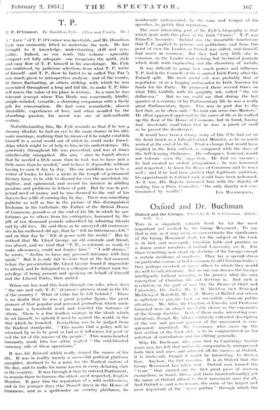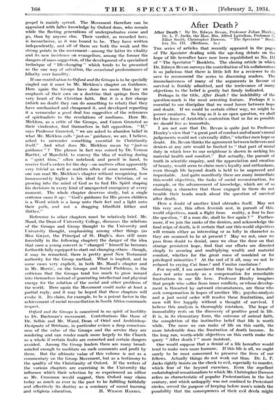Oxford and Dr. Buchman
Tim Is is a singillarly valualile hi ink by far the most important yet evoked by the Group Movement. To say that is not, as it. may seem. to 41%-er-estimate the significanee of the Group Movement itself, for the subject of the hook is, in fact, and necessarily, Christian faith and practice as a dozen senior members of Oxford University see it. For there is mithing new at the doctrine if the Gnaws exeept a certain incidence of emphasis. They lay a special stress on particular canons fir 'wl let. common to all (111risl ian bodies ; they perhaps overlook or ignore others to which they would do well to call at tent ion. But no one can discuss the Groups intelligently without revealing in the process what his own conception of Christian life and doctrine is. And such a revelation on the part, of Inca like the Deans of Oriel and University, 1/r. Jacks, Mr. V. 11. Micklem (not Principal Mieklem) of Mansfield, Mr. C. It. Morris of Balliol and °therm is sufficient to give the book an irresistible claim on piddle attention. Mr. Allen, the Chaplain of Lincoln, and Professor Grensted were an almost. inevitable choice as the exponents of the Group doctrine. Both of them make interesting con- tributions, though Mr. Allcas relatively extended description of the rise and present position of the movement is con- spicuously uncritical. Mr. Crossman, who sums up Boo first section of the book ably, is to be congratulated on his selection of contributors and his editing generally.
Why Dr. Buchman, who came first to Cambridge twelve years ago, has left that university comparatively unimpressed both then and since, and achieved all his success at Oxford, it is irrelevant, though it might. be interesting, to discuss here. Anyhow, the fact renmins. It is at Oxford that the Group Movement has taken root. Oxford men formed the " team " that carried out the first great piece of oversea evangelism, in South Africa, and there (unintentionally) got the name of Oxford affixed to their movement once for all. And Oxford is, and is to remain, the scene of the largest and most important of the " house-parties " through which tho
gospel is mainly spread. The Movement therefore can be appraised with fuller knowledge by Oxford dons, who remain while the fleeting generations Of undergraduates come and go, than by anyone else. Their verdict, as recorded here, is inconclusive, as it was bound to be. They have written independently, and all of them see both the weak and the strong points in the movement—among the latter its vitality and its new insistence on evangelism, among the former the dangers of mass-suggestion, of the development of a specialized technique of " life-changing " which tends to be presented as the one way of salvation, the occasional predominance of hilarity over humility.
If one contribution to Oxford and the Groups is to be specially singled out it must be Mr. Micklem's chapter on Guidance.
Here again the Groups have done no more than lay an emphasis of their own on a doctrine that springs from the very heart of the Christian faith. But it is a -fair charge (which no doubt they can do something to rebut) that they have mechanized and cheapened it, and developed regarding it a vernacular a good deal too suggestive of the references of spiritualists to the revelations of mediums. Here Mr.
Micklem, as a critic of the Groups, and Canon Grensted as their vindicator, find themselves in full opposition. `.• If," says Professor Grensted, "we are asked to abandon belief in what Mr. Micklem calls ' just-so ' guidance, we are, I believe, asked to surrender something essential to Christianity itself." And what does Mr. Micklem mean by "just-so guidance " ? The phrase in fact was coined by Dr. Vernon Bartlet, of Mansfield, to convey the idea of waiting during a "quiet time," often notebook and pencil in hand, to receive God's orders for the day—on matters often apparently very trivial as well as matters often of some moment. No one can read Mr. Micklem's chapter without recognizing how immeasurably higher is his ideal for the Christian, of so growing into the mind of God as to find His Spirit shaping his decisions in every kind of unexpected emergency at every moment. The whole chapter deserves study, but a single sentence sums it up : "God's guidance for His grown children is a Word which is a lamp unto their feet and a light unto their path, and not a dragging blindfold hither and thither."
Reference to other chapters must be relatively brief. Mr. Maud, the Dean of University College, discusses the relations of the Groups and Group thought to the University and University thought, emphasizing among other things (as Miss Gwyer, the Principal of St. Hugh's, does still more forcefully in the following chapter) the danger of the idea that once a young convert is " changed " himself he becomes forthwith fully equipped to start out changing others—though, it may be remarked, there is pretty good New Testament authority for the Group method. What is implicit, and in some cases very explicit, in both Mr. Maud's chapter and in Mr. Morris', on the Groups and Social Problems, is the criticism that the Groups tend too much to grow inward into themselves instead of generating intellectual and physical energy for the solution of the social and other problems of
the world. Here again the Movement -could make at least a partial reply, and it may be hoped that these chapters will
evoke it. Its claim, for example, to be a potent factor in the achievement of racial reconciliation in South Africa commands respect.
Oxford and the Groups is conceived in no spirit of hostility to Dr. Buchman's movement. Contributions like those of Dr. Selbie and Mr. Wand, Dean of Oriel and Archbishop. Designate of Brisbane, in particular evince a deep conscious- ness of the value of the Groups and the service they are rendering and can Tender much more largely to the Church as a whole if certain faults are corrected and certain dangers avoided. Among the Group leaders there are many broad- minded enough to meditate on such comments and profit by them. But the ultimate value of this volume is not as a commentary on the Group Movement, but as a testimony -to the quality of the Christianity of Oxford. If the writers of the various chapters are exercising in the University the influence which their selection by so experienced an editor as Mr. Crossman would suggest, then Oxford may claim today as much as ever in the past to be fulfilling faithfully and effectively its destiny as a seminary of sound learning









































 Previous page
Previous page